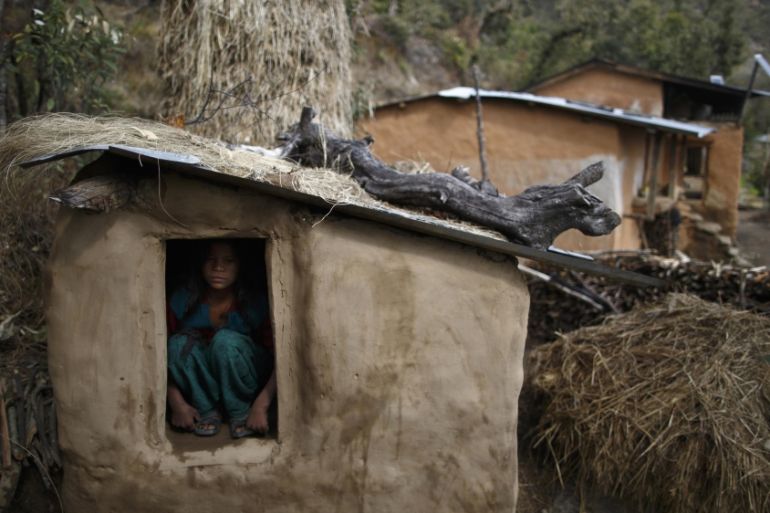Nepali girl dies due to banned menstruation practice
A 15-year-old girl suffocated to death after she was made to sleep in a shed because she was menstruating.

A 15-year-old girl has died in Nepal’s western Achram district after she was banished to a shed because she was menstruating, under an ancient Hindu practice that has been banned for more than a decade, police said.
“We are investigating the case. We suspect that she died of suffocation from the smoke of a fire she lit to keep herself warm,” local district inspector Badri Prasad Dhakal told the AFP news agency on Monday.
Keep reading
list of 4 itemsPoland lawmakers take steps towards liberalising abortion laws
Polish lawmakers debate reforming strict abortion laws
Why has Arizona re-enacted a 160-year-old abortion ban?
Local media identified the girl as Roshani Tiruwa.
Some Hindus view menstruating women as impure and in parts of Nepal they are forced to remain in a hut or cowshed for days, a practice known as chhaupadi.
15-yr-old dies in Chhaupadi shed, in Western Nepal | https://t.co/oeXANlY0TA pic.twitter.com/UluOSo7YQ8 #Chhaupadideath
— Ashok Dahal (@ashokpillar) December 19, 2016
Truwa’s father told Nepalese newspaper My Republica that she had had an evening meal at around 6pm on Friday and went inside the shed to sleep.
When it was late in the morning and she had not been seen, he gave her a call from outside.
“Then we saw her dead body,” he said.
INTERACTIVE: Banished – Why menstruation can mean exile
According to the newspaper, Truwa was a ninth grader at Rastara Bhasah Secondary School and was undergoing the third day of menstruation at the time of her death.
|
|
Superstition
Under the chhaupadi practice, women are banned from taking part in normal family activities during menstruation and after childbirth, and can have no contact with men of the household.
The Hindu tradition is common to all castes in the region. Women who violate the practice are blamed for crop failures, illnesses and sudden deaths of animals.
There are previous reports of chhaupadi leading to deaths, attacks by wild animals, snakebites, diseases, rapes, poor mental health, and infants dying of pneumonia.
In recent years, some women have turned their back on the ritual: a few burnt their sheds, and some villages are known as “chhaupadi-free zones”.
But although the country’s Supreme Court banned practising chhaupadi in 2005, the custom dies hard. It remains firmly rooted in many villages, especially in remote hill areas.
Mohna Ansari of Nepal’s National Human Rights Commission said local leaders must do more to enforce the ban.
“We have a legal ban but the law enforcement forces have not been strong about implementing it,” she said.
“It is crucial for us to work to change the attitudes of the people and raise awareness against this practice.
A 2011 UN report estimated that 95 percent of women in Achham district follow it.